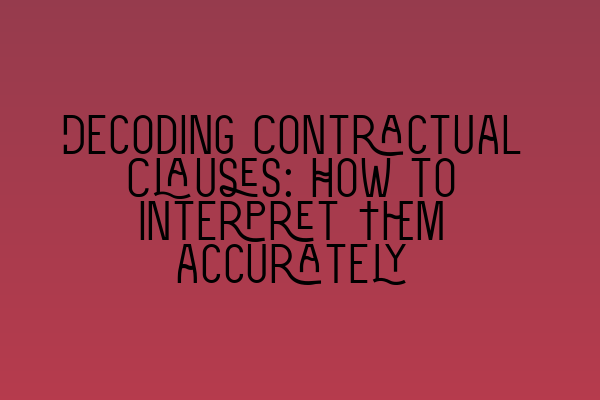Decoding Contractual Clauses: How to Interpret Them Accurately
Contracts are fundamental to the legal landscape, serving as the backbone of countless transactions, agreements, and relationships. These legally binding documents outline the rights and responsibilities of the parties involved, ensuring clarity and avoiding potential disputes.
However, contracts can be complex and overwhelming, filled with legal jargon and intricate clauses. Understanding and interpreting these clauses accurately is crucial to ensure that you are fully aware of your rights and obligations. In this article, we will decode contractual clauses and provide you with the tools to navigate your way through them confidently.
1. Start with the Basics: Define Key Terminology
Before diving into the intricacies of contractual clauses, it’s essential to establish a solid foundation by defining key terminology. Contracts often contain specific terms and phrases that may have different meanings in a legal context. By familiarizing yourself with these terms, you can ensure that you are interpreting the clauses correctly.
For example, words like “shall,” “may,” or “must” can have distinct legal implications. Understanding the distinction between these terms can significantly impact the obligations and rights of the parties involved in the contract. By carefully studying the definitions and context of these terms, you can avoid any misunderstandings.
Further enhance your understanding of legal terminology by referring to top law schools in the UK that offer comprehensive legal education and training.
2. Analyze the Structure and Organization of the Contract
The structure and organization of a contract play a crucial role in contract interpretation. Contracts are generally divided into different sections, with each section addressing specific aspects of the agreement. By reviewing the contract’s organization, you can gain insight into the intended meaning of the clauses.
Pay attention to headings, subheadings, and numbering within the contract. These can give you clues about the significance of different sections and the relationship between clauses. Additionally, look for any cross-references that direct you to other parts of the contract for further information.
3. Identify Ambiguities and Seek Clarification
While contracts strive to be clear and unambiguous, there may still be instances where certain clauses can be subject to different interpretations. These ambiguities can arise due to vague wording, conflicting clauses, or industry-specific terms.
If you encounter an ambiguous clause, it is essential not to make assumptions or jump to conclusions. Instead, seek clarification from other parts of the contract, relevant industry standards, or applicable laws. If necessary, consult with legal experts or experienced solicitors who can provide valuable insight and guidance.
Navigating legal challenges and pitfalls in your practice requires a solid foundation of legal knowledge and expertise. Check out our article on navigating legal challenges and pitfalls in your practice for tips and strategies to overcome common obstacles.
4. Consider the Surrounding Context and Intent
Contractual clauses can often be better understood when considered within the context of the entire agreement. By examining the contract as a whole, you can decipher the parties’ intentions and the overarching purpose of the contract.
Look for any recitals, definitions, or introductory clauses that provide additional context and shed light on the purpose and scope of the agreement. Understanding the intentions of the parties involved can help you interpret the specific clauses in a manner that aligns with their overall goals.
5. Review Previous Interpretations and Case Law Precedents
Legal interpretation is not limited to the text of the contract itself. Previous interpretations of similar clauses and relevant case law can provide valuable guidance in understanding contractual provisions.
Researching case law precedents related to the specific area of law can help you determine how courts have interpreted similar clauses in the past. Consider consulting legal databases, legal journals, or seek guidance from experienced solicitors who specialize in the relevant field.
6. Seek Professional Advice
Interpreting contractual clauses can be challenging, and mistakes can have significant consequences. If you are unsure about the interpretation or implications of contractual clauses, it is always wise to seek professional legal advice.
Consulting with experienced solicitors who specialize in contract law can provide you with the expert guidance and insights you need. Their expertise and knowledge will ensure that your interests are protected and that you have a thorough understanding of the contract’s provisions.
Understanding contractual clauses is a vital skill for solicitors, who often encounter complex contracts in their practice. Ensure you have a solid understanding of the SRA Competence Statement by referring to our article on Understanding the SRA Competence Statement: A Guide for Solicitors.
Conclusion
Interpreting contractual clauses accurately is essential to ensure that you fully understand your rights and obligations. By starting with a strong foundation of key legal terminology, analyzing the structure of the contract, seeking clarification for ambiguities, considering the surrounding context, reviewing previous interpretations and seeking professional advice when needed, you can navigate through complex contractual clauses with confidence.
Remember, with the right knowledge and guidance, you can decode and interpret contractual clauses accurately, protecting your interests and avoiding potential disputes.
